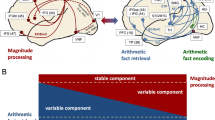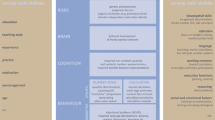Abstract
Numerical understanding is important for everyday life. For children with developmental dyscalculia (DD), numbers and magnitudes present profound problems which are thought to be based upon neuronal impairments of key regions for numerical understanding. The aim of the present study was to investigate possible differences in white matter fibre integrity between children with DD and controls using diffusion tensor imaging. White matter integrity and behavioural measures were evaluated in 15 children with developmental dyscalculia aged around 10 years and 15 matched controls. The main finding, obtained by a whole brain group comparison, revealed reduced fractional anisotropy in the superior longitudinal fasciculus in children with developmental dyscalculia. In addition, a region of interest analysis exhibited prominent deficits in fibres of the superior longitudinal fasciculus adjacent to the intraparietal sulcus, which is thought to be the core region for number processing. To conclude, our results outline deficient fibre projection between parietal, temporal and frontal regions in children with developmental dyscalculia, and therefore raise the question of whether dyscalculia can be seen as a dysconnection syndrome. Since the superior longitudinal fasciculus is involved in the integration and control of distributed brain processes, the present results highlight the importance of considering broader domain-general mechanisms in the diagnosis and therapy of dyscalculia.


Similar content being viewed by others
References
Arsalidou M, Taylor MJ (2011) Is 2 + 2 = 4? Meta-analyses of brain areas needed for numbers and calculations. Neuroimage 54(3):2382–2393
Barbey AK, Colom R, Solomon J, Krueger F, Forbes C, Grafman J (2012) An integrative architecture for general intelligence and executive function revealed by lesion mapping. Brain 135(Pt 4):1154–1164
Barbey AK, Colom R, Grafman J (2013) Dorsolateral prefrontal contributions to human intelligence. Neuropsychologia 51(7):1361–1369
Barnea-Goraly N, Eliez S, Menon V, Bammer R, Reiss AL (2005) Arithmetic ability and parietal alterations: a diffusion tensor imaging study in velocardiofacial syndrome. Brain Res Cogn Brain Res 25(3):735–740
Beblo T, Macek C, Brinkers I, Hartje W, Klaver P (2004) A new approach in clinical neuropsychology to the assessment of spatial working memory: the block suppression test. J Clin Exp Neuropsychol 26(1):105–114
Corsi PM (1972) Human memory and the temporal region of the brain. Diss Abstr Int 34(2-B):891
Deary IJ, Bastin ME, Pattie A, Clayden JD, Whalley LJ, Starr JM, Wardlaw JM (2006) White matter integrity and cognition in childhood and old age. Neurology 66(4):505–512
Deary IJ, Penke L, Johnson W (2010) The neuroscience of human intelligence differences. Nat Rev Neurosci 11(3):201–211
Dehaene S, Piazza M, Pinel P, Cohen JD (2003) Three parietal circuits for number processing. Cogn Neuropsychol 20(3):487–506
Delazer M, Domahs F, Bartha L, Brenneis C, Lochy A, Trieb T, Benke T (2003) Learning complex arithmetic—an fMRI study. Brain Res Cogn Brain Res 18(1):76–88
Duncan GJ, Dowsett CJ, Claessens A, Magnuson K, Huston AC, Klebanov P, Pagani LS, Feinstein L, Engel M, Brooks-Gunn J, Sexton H, Duckworth K, Japel C (2007) School readiness and later achievement. Dev Psychol 43(6):1428–1446
Fulbright RK, Manson SC, Skudlarski P, Lacadie CM, Gore JC (2003) Quantity determination and the distance effect with letters, numbers, and shapes: a functional MR imaging study of number processing. AJNR Am J Neuroradiol 24(2):193–200
Gläscher J, Rudrauf D, Colom R, Paul LK, Tranel D, Damasio H, Adolphs R (2010) Distributed neural system for general intelligence revealed by lesion mapping. Proc Natl Acad Sci USA 107(10):4705–4709
Grabner RH, Ansari D, Koschutnig K, Reishofer G, Ebner F (2011) The function of the left angular gyrus in mental arithmetic: evidence from the associative confusion effect. Hum Brain Mapp 34(5):1013–1024
Gross J, Hudson C, Price D (2009) The long term costs of numeracy difficulties. Every Child a Chance Trust and KPMG, London
Hayasaka S, Phan KL, Liberzon I, Worsley KJ, Nichols TE (2004) Nonstationary cluster-size inference with random field and permutation methods. Neuroimage 22(2):676–687
Holmes RD, Mazabel S, Maedler B, Denk C, Siegel L, Beaulieu C, MacKay A (2010) Cerebral myelin content correlation with mathematical abilities in young children. In: ISMRM-ESMRMB, Stockholm
Hu Y, Geng F, Tao L, Hu N, Du F, Fu K, Chen F (2011) Enhanced white matter tracts integrity in children with abacus training. Hum Brain Mapp 32(1):10–21
Hua K, Zhang J, Wakana S, Jiang H, Li X, Reich DS, Calabresi PA, Pekar JJ, van Zijl PC, Mori S (2008) Tract probability maps in stereotaxic spaces: analyses of white matter anatomy and tract-specific quantification. Neuroimage 39(1):336–347
Hugenschmidt CE, Peiffer AM, Kraft RA, Casanova R, Deibler AR, Burdette JH, Maldjian JA, Laurienti PJ (2008) Relating imaging indices of white matter integrity and volume in healthy older adults. 18(2):433–442. doi:10.1093/cercor/bhm080
Hüppi PS (2010) Growth and development of the brain and impact on cognitive outcomes. Nestle Nutr Workshop Ser Pediatr Program 65:137–149 (discussion 149–151)
Hüppi PS, Dubois J (2006) Diffusion tensor imaging of brain development. Sem Fetal Neonatal Med 11(6):489–497
Jung RE, Haier RJ (2007) The parieto-frontal integration theory (P-FIT) of intelligence: converging neuroimaging evidence. Behav Brain Sci 30(2):135–154 (discussion 154–187)
Kaufmann L, Vogel S, Starke M, Kremser C, Schocke M (2009) Numerical and non-numerical ordinality processing in children with and without developmental dyscalculia: evidence from fMRI. Cogn Dev 24(4):486–494
Kaufmann L, Wood G, Rubinsten O, Henik A (2011) Meta-analyses of developmental fMRI studies investigating typical and atypical trajectories of number processing and calculation. Dev Neuropsychol 36(6):763–787
Knops A, Nuerk HC, Fimm B, Vohn R, Willmes K (2006) A special role for numbers in working memory? An fMRI study. Neuroimage 29(1):1–14
Koch K, Wagner G, Dahnke R, Schachtzabel C, Gullmar D, Reichenbach JR, Schlosser RG (2010) Structure-function relationships in the context of reinforcement-related learning: a combined diffusion tensor imaging-functional magnetic resonance imaging study. Neuroscience 168(1):190–199
Kovas Y, Giampietro V, Viding E, Ng V, Brammer M, Barker GJ, Happe FG, Plomin R (2009) Brain correlates of non-symbolic numerosity estimation in low and high mathematical ability children. PLoS One 4(2):e4587
Kucian K, Loenneker T, Dietrich T, Dosch M, Martin E, von Aster M (2006) Impaired neural networks for approximate calculation in dyscalculic children: a functional MRI study. Behav Brain Funct 2:31
Kucian K, von Aster M, Loenneker T, Dietrich T, Martin E (2008) Development of neural networks for exact and approximate calculation: a FMRI study. Dev Neuropsychol 33(4):447–473
Kucian K, Grond U, Rotzer S, Henzi B, Schonmann C, Plangger F, Galli M, Martin E, von Aster M (2011a) Mental number line training in children with developmental dyscalculia. Neuroimage 57(3):782–795
Kucian K, Loenneker T, Martin E, von Aster M (2011b) Non-symbolic numerical distance effect in children with and without developmental dyscalculia: a parametric FMRI study. Dev Neuropsychol 36(6):741–762
Le Bihan D, Mangin JF, Poupon C, Clark CA, Pappata S, Molko N, Chabriat H (2001) Diffusion tensor imaging: concepts and applications. J Magn Reson Imaging 13(4):534–546
Mori S, Van Zijl PC, Oishi K, Faria AV (2005) MRI atlas of human white matter. Elsevier, Amsterdam
Mussolin C, De Volder A, Grandin C, Schlogel X, Nassogne MC, Noel MP (2010) Neural correlates of symbolic number comparison in developmental dyscalculia. J Cogn Neurosci 22(5):860–874
Naghavi HR, Nyberg L (2007) Integrative action in the fronto-parietal network: a cure for a scattered mind. Behav Brain Sci 30:161–162
Oldfield RC (1971) The assessment and analysis of handedness: the Edinburgh inventory. Neuropsychologia 9(1):97–113
Parsons S, Bynner J (2005) Does numeracy matter more? National Research and Development Centre for adult literacy and numeracy. Institute of Education, London
Price GR, Holloway I, Räsänen P, Vesterinen M, Ansari D (2007) Impaired parietal magnitude processing in developmental dyscalculia. Curr Biol 17(24):R1042–R1043
Rauschecker AM, Deutsch GK, Ben-Shachar M, Schwartzman A, Perry LM, Dougherty RF (2009) Reading impairment in a patient with missing arcuate fasciculus. Neuropsychologia 47(1):180–194
Reigosa-Crespo V, Valdes-Sosa M, Butterworth B, Estevez N, Rodriguez M, Santos E, Torres P, Suarez R, Lage A (2012) Basic numerical capacities and prevalence of developmental dyscalculia: the Havana survey. Dev Psychol 48(1):123–135
Rotzer S, Loenneker T, Kucian K, Martin E, Klaver P, von Aster M (2009) Dysfunctional neural network of spatial working memory contributes to developmental dyscalculia. Neuropsychologia 47(13):2859–2865
Rykhlevskaia E, Uddin LQ, Kondos L, Menon V (2009) Neuroanatomical correlates of developmental dyscalculia: combined evidence from morphometry and tractography. Front Hum Neurosci 3:51
Schmahmann JD, Pandya DN, Wang R, Dai G, D’Arceuil HE, de Crespigny AJ, Wedeen VJ (2007) Association fibre pathways of the brain: parallel observations from diffusion spectrum imaging and autoradiography. Brain 130(Pt 3):630–653
Schmithorst VJ, Wilke M, Dardzinski BJ, Holland SK (2005) Cognitive functions correlate with white matter architecture in a normal pediatric population: a diffusion tensor MRI study. Hum Brain Mapp 26(2):139–147
Shalev RS, von Aster M (2008) Identification, classification, and prevalence of developmental dyscalculia. Encyclopedia of Language and Literacy Development, London, pp 1–9
Shalev RS, Auerbach J, Manor O, Gross-Tsur V (2000) Developmental dyscalculia: prevalence and prognosis. Eur Child Adolesc Psychiatry 9(Suppl 2):II58–II64
Smith SM, Jenkinson M, Woolrich MW, Beckmann CF, Behrens TE, Johansen-Berg H, Bannister PR, De Luca M, Drobnjak I, Flitney DE, Niazy RK, Saunders J, Vickers J, Zhang Y, De Stefano N, Brady JM, Matthews PM (2004) Advances in functional and structural MR image analysis and implementation as FSL. Neuroimage 23(Suppl 1):S208–S219
Tanaka H, Black JM, Hulme C, Stanley LM, Kesler SR, Whitfield-Gabrieli S, Reiss AL, Gabrieli JD, Hoeft F (2011) The brain basis of the phonological deficit in dyslexia is independent of IQ. Psychol Sci 22(11):1442–1451
Till C, Deotto A, Tipu V, Sled JG, Bethune A, Narayanan S, Arnold DL, Banwell BL (2011) White matter integrity and math performance in pediatric multiple sclerosis: a diffusion tensor imaging study. Neuroreport 22(18):1005–1009
Tsang JM, Dougherty RF, Deutsch GK, Wandell BA, Ben-Shachar M (2009) Frontoparietal white matter diffusion properties predict mental arithmetic skills in children. Proc Natl Acad Sci USA 106(52):22546–22551
Turken A, Whitfield-Gabrieli S, Bammer R, Baldo JV, Dronkers NF, Gabrieli JD (2008) Cognitive processing speed and the structure of white matter pathways: convergent evidence from normal variation and lesion studies. Neuroimage 42(2):1032–1044
van Eimeren L, Niogi SN, McCandliss BD, Holloway ID, Ansari D (2008) White matter microstructures underlying mathematical abilities in children. Neuroreport 19(11):1117–1121
Vandermosten M, Boets B, Wouters J, Ghesquière P (2012) A qualitative and quantitative review of diffusion tensor imaging studies in reading and dyslexia. Neurosci Biobehav Rev 36(6):1532–1552
Vestergaard M, Madsen KS, Baare WF, Skimminge A, Ejersbo LR, Ramsoy TZ, Gerlach C, Akeson P, Paulson OB, Jernigan TL (2011) White matter microstructure in superior longitudinal fasciculus associated with spatial working memory performance in children. J Cogn Neurosci 23(9):2135–2146
von Aster M, Weinhold Zulauf M, Horn R (2006) ZAREKI-R (neuropsychological test battery for number processing and calculation in children), revidierte version. Harcourt Test Services, Frankfurt
von Aster M, Schweiter M, Weinhold Zulauf M (2007) Rechenstörungen bei Kindern: Vorläufer, Prävalenz und psychische Symptome. Z Entwicklungspsychol Padagog Psychol 39(2):85–96
Wakana S, Caprihan A, Panzenboeck MM, Fallon JH, Perry M, Gollub RL, Hua K, Zhang J, Jiang H, Dubey P, Blitz A, van Zijl P, Mori S (2007) Reproducibility of quantitative tractography methods applied to cerebral white matter. Neuroimage 36(3):630–644
Wechsler D (1999) WISC-III Wechsler Intelligence Scale for Children, 3rd edn. Hans Huber, Bern, Göttingen, Toronto, Seattle
Wheeler-Kingshott CA, Cercignani M (2009) About “axial” and “radial” diffusivities. Magn Reson Med 61(5):1255–1260
WMA (2002) The World Medical Association’s Declaration of Helsinki: ethical principles for medical research involving human subjects. WMA General Assembly, Washington
Woolrich MW, Jbabdi S, Patenaude B, Chappell M, Makni S, Behrens T, Beckmann C, Jenkinson M, Smith SM (2009) Bayesian analysis of neuroimaging data in FSL. Neuroimage 45(1 Suppl):S173–S186
Acknowledgments
Many thanks to all children and parents, who participated in this study, to the financial support by the German Federal Ministry of Education and Research (01GJ1011) and the NOMIS-Foundation and the proof-reading by PD Dr. Ruth O’Gorman.
Author information
Authors and Affiliations
Corresponding author
Additional information
Karin Kucian and Simone Schwizer Ashkenazi contributed equally to this work.
Rights and permissions
About this article
Cite this article
Kucian, K., Ashkenazi, S.S., Hänggi, J. et al. Developmental dyscalculia: a dysconnection syndrome?. Brain Struct Funct 219, 1721–1733 (2014). https://doi.org/10.1007/s00429-013-0597-4
Received:
Accepted:
Published:
Issue Date:
DOI: https://doi.org/10.1007/s00429-013-0597-4




